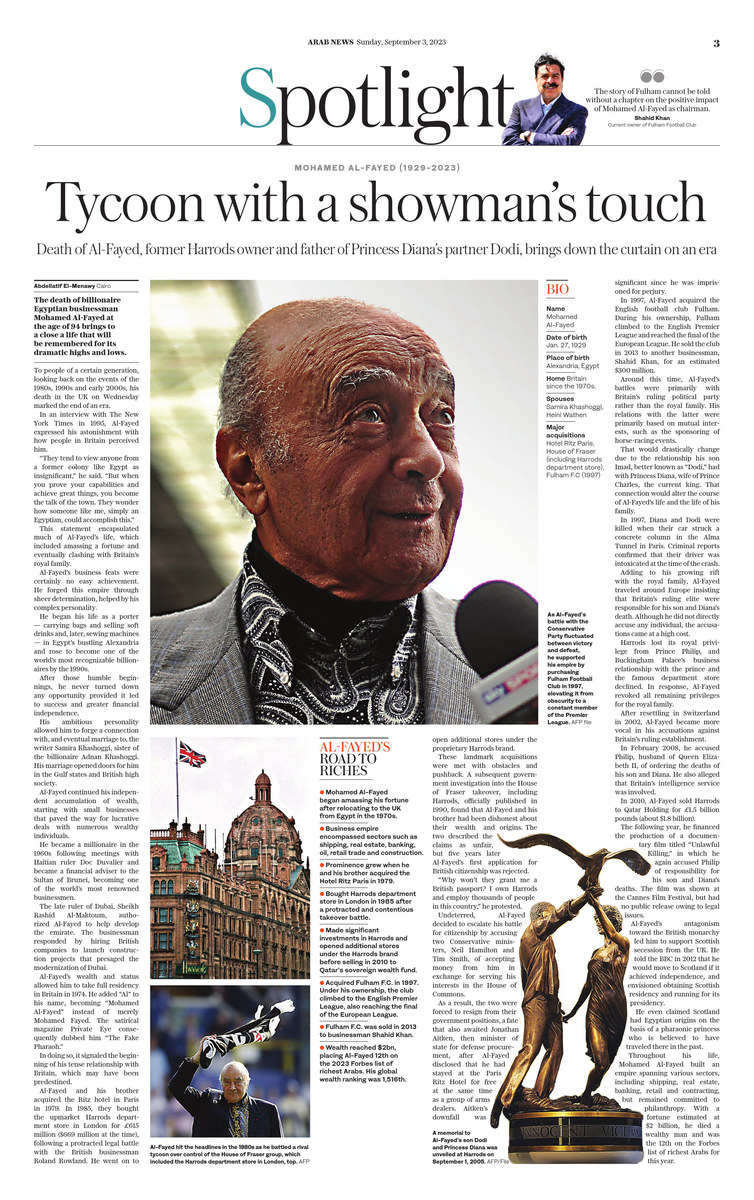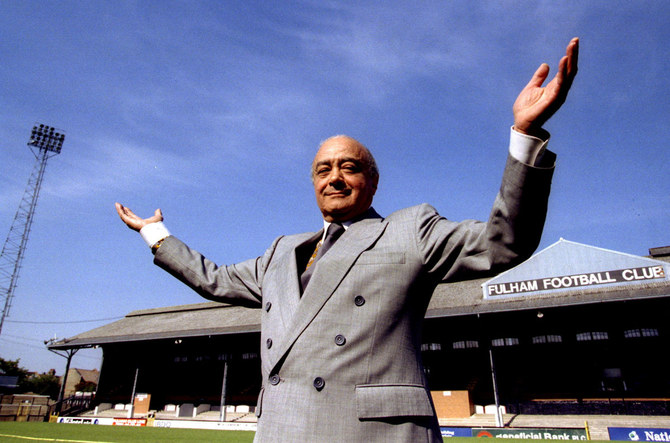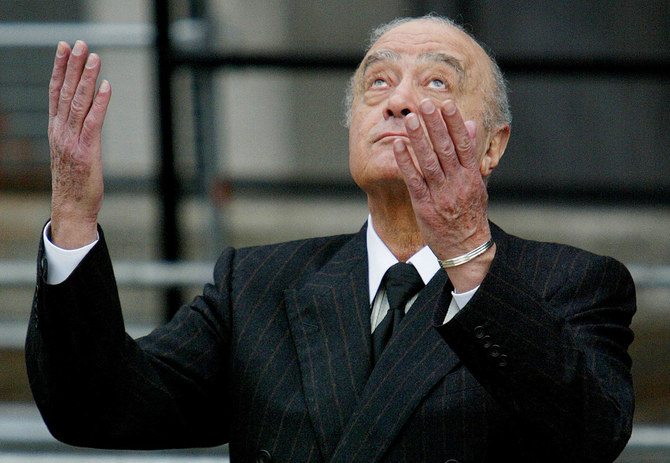CAIRO: The death of Egyptian-born businessman Mohamed Al-Fayed at the age of 94 has brought to a close a remarkable saga of success, setbacks, tragedy and recovery.
To people of a certain generation, looking back on the events of the 1980s, 1990s and early 2000s, his death in the UK on Wednesday truly marked the end of an era.
In an interview with The New York Times in 1995, Al-Fayed expressed his astonishment with how people in Britain perceived him.
“They tend to view anyone from a former colony like Egypt as insignificant,” he said. “But when you prove your capabilities and achieve great things, you become the talk of the town. They wonder how someone like me, simply an Egyptian, could accomplish this.”
This statement encapsulated much of Al-Fayed’s life, which included amassing a fortune and eventually clashing with Britain’s royal family.
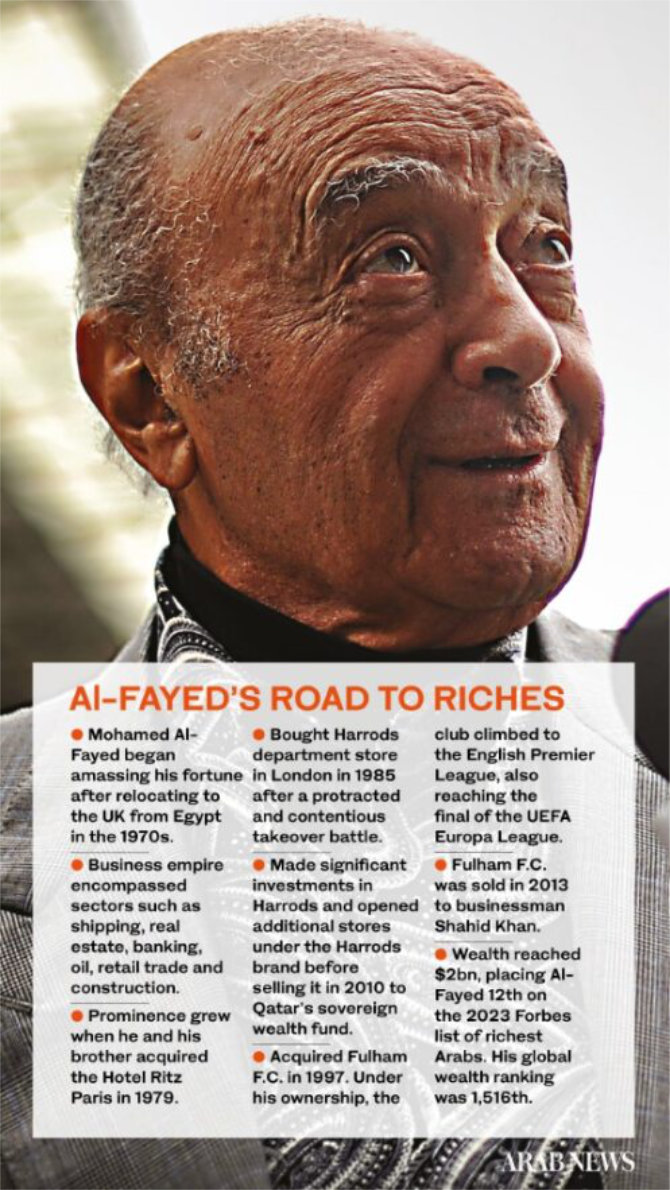
Al-Fayed’s business feats were certainly no easy achievement. He forged this empire through sheer determination, helped by his complex personality.
He began his life as a porter — carrying bags and selling soft drinks and, later, sewing machines — in Egypt’s bustling Alexandria and rose to become one of the world’s most recognizable billionaires by the 1990s.
After those humble beginnings, he never turned down any opportunity provided it led to success and greater financial independence.
His ambitious personality allowed him to forge a connection with, and eventual marriage to, the writer Samira Khashoggi, sister of the billionaire Adnan Khashoggi. His marriage opened doors for him in the Gulf states and British high society.
Al-Fayed continued his independent accumulation of wealth, starting with small businesses that paved the way for lucrative deals with numerous wealthy individuals.
He became a millionaire in the 1960s following meetings with Haitian ruler Doc Duvalier and became a financial adviser to the Sultan of Brunei, becoming one of the world’s most renowned businessmen.
BIO
- Name: Mohamed Al-Fayed
- Date of birth: Jan. 27, 1929
- Place of birth: Alexandria, Egypt
- Home: Britain, since the 1970s.
- Spouses: Samira Khashoggi, Heini Wathen
- Major acquisitions: Hotel Ritz Paris; House of Fraser, including Harrods department store; Fulham F.C. (1997)
The late ruler of Dubai, Sheikh Rashid Al-Maktoum, authorized Al-Fayed to help develop the emirate. The businessman responded by hiring British companies to launch construction projects that presaged the modernization of Dubai.
Al-Fayed’s wealth and status allowed him to take full residency in Britain in 1974. He added “Al” to his name, becoming “Mohamed Al-Fayed” instead of merely Mohamed Fayed. The satirical magazine Private Eye consequently dubbed him “The Fake Pharaoh.”
In doing so, it signaled the beginning of his tense relationship with Britain, which may have been predestined.
Al-Fayed and his brother acquired the Ritz hotel in Paris in 1979. In 1985, they bought the upmarket Harrods department store in London for £615 million ($669 million at the time), following a protracted legal battle with the British businessman Roland Rowland. He went on to open additional stores under the proprietary Harrods brand.
These landmark acquisitions were met with obstacles and pushback. A subsequent government investigation into the House of Fraser takeover, including Harrods, officially published in 1990, found that Al-Fayed and his brother had been dishonest about their wealth and origins. The two described the claims as unfair, but five years later Al-Fayed’s first application for British citizenship was rejected.
“Why won’t they grant me a British passport? I own Harrods and employ thousands of people in this country,” he protested.
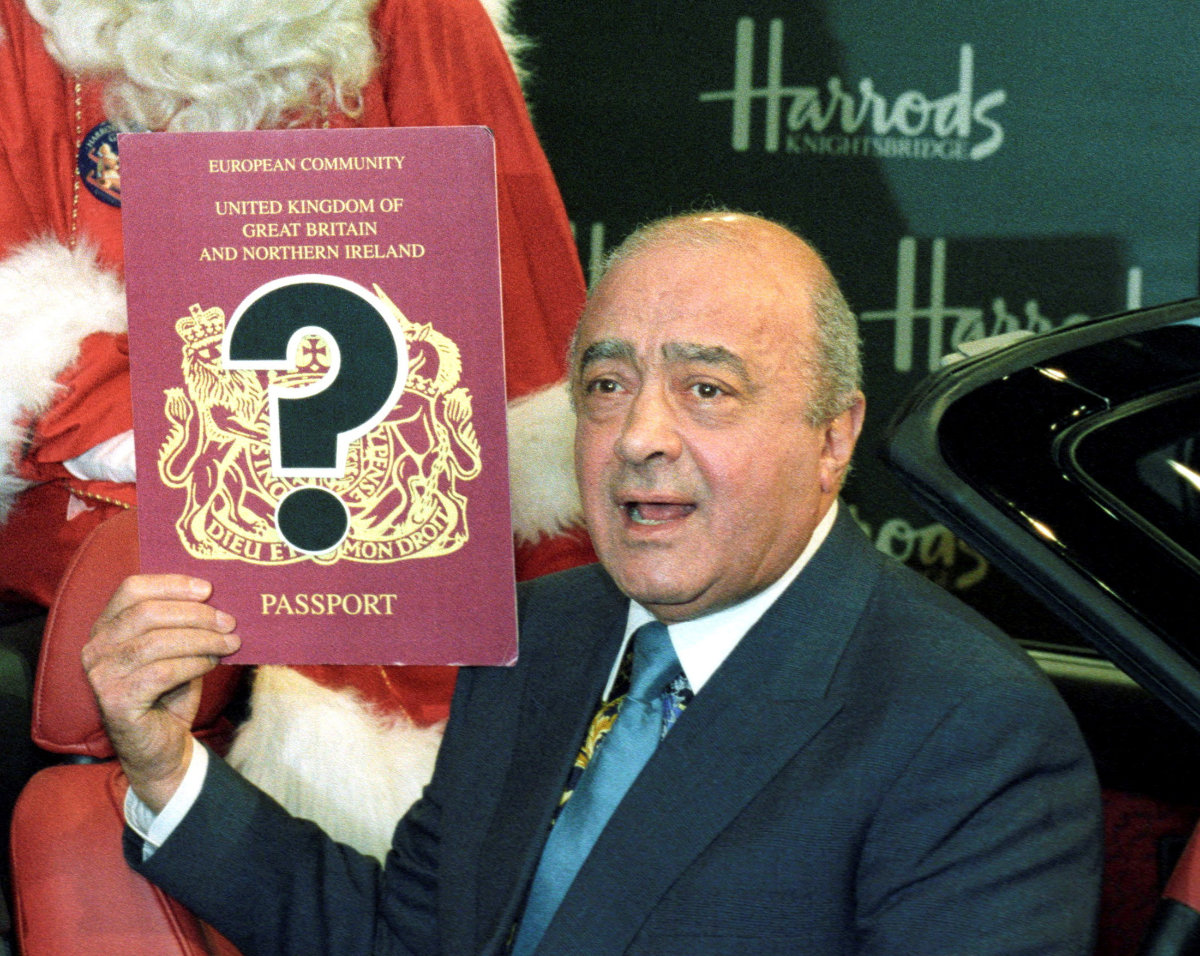
In this on November 13, 1996, photo, Harrods' department store owner Mohamed Al Fayed shows off a card in the form of an over-sized passport during a news conference in London after he and his brother Ali won a court battle against the British government's refusal to grant them citizenship. (REUTERS/File Photo)
Undeterred, Al-Fayed decided to escalate his battle for citizenship by accusing two Conservative ministers, Neil Hamilton and Tim Smith, of accepting money from him in exchange for serving his interests in the House of Commons.
As a result, the two were forced to resign from their government positions, a fate that also awaited Jonathan Aitken, then minister of state for defense procurement, after Al-Fayed disclosed that he had stayed at the Paris Ritz Hotel for free at the same time as a group of arms dealers. Aitken’s downfall was significant since he was imprisoned for perjury.
In 1997, Al-Fayed acquired the English football club Fulham. During his ownership, Fulham climbed to the English Premier League and reached the final of the European League. He sold the club in 2013 to another businessman, Shahid Khan, for an estimated $300 million.

The story of Fulham cannot be told without a chapter on the positive impact of Mohamed Al-Fayed as chairman, says Shahid Khan, the current owner of Fulham Football Club. (AFP file photo)
Around this time, Al-Fayed’s battles were primarily with Britain’s ruling political party rather than the royal family. His relations with the latter were primarily based on mutual interests, such as the sponsoring of horse-racing events.
That would drastically change due to the relationship his son Imad, better known as “Dodi,” had with Princess Diana, wife of Prince Charles, the current king. That connection would alter the course of Al-Fayed’s life and the life of his family.
In 1997, Diana and Dodi were killed when their car struck a concrete column in the Alma Tunnel in Paris. Criminal reports confirmed that their driver was intoxicated at the time of the crash.
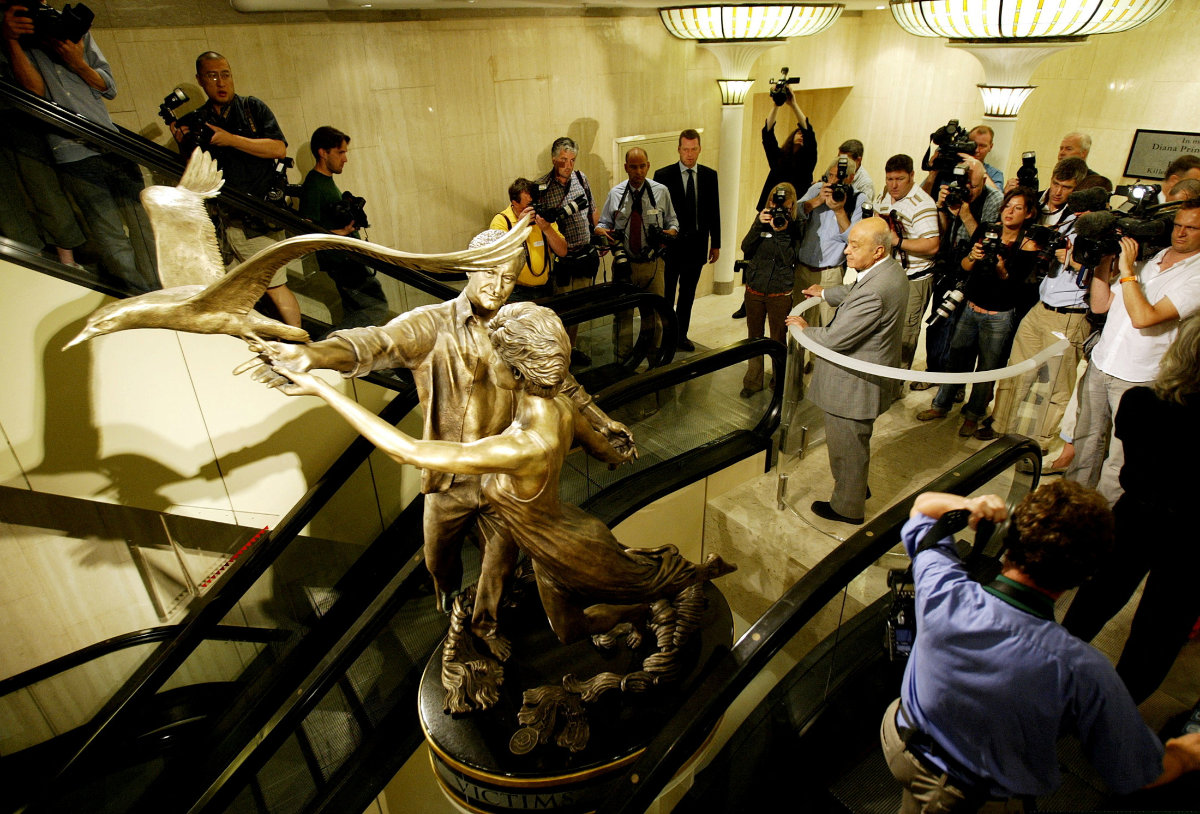
Harrods chairman Mohamed Al Fayed (R) unveils a memorial (L) to his son Dodi and Britain's Diana, Princess of Wales at Harrods in London, September 1, 2005. (REUTERS/File Photo)
Adding to his growing rift with the royal family, Al-Fayed traveled around Europe insisting that Britain’s ruling elite were responsible for his son and Diana’s death. Although he did not directly accuse any individual, the accusations came at a high cost.
Harrods lost its royal privilege from Prince Philip, and Buckingham Palace’s business relationship with the prince and the famous department store declined. In response, Al-Fayed revoked all remaining privileges for the royal family.
After resettling in Switzerland in 2002, Al-Fayed became more vocal in his accusations against Britain’s ruling establishment.
In February 2008, he accused Philip, husband of Queen Elizabeth II, of ordering the deaths of his son and Diana. He also alleged that Britain’s intelligence service was involved.
In 2010, Al-Fayed sold Harrods to Qatar Holding for £1.5 billion pounds (about $1.8 billion).
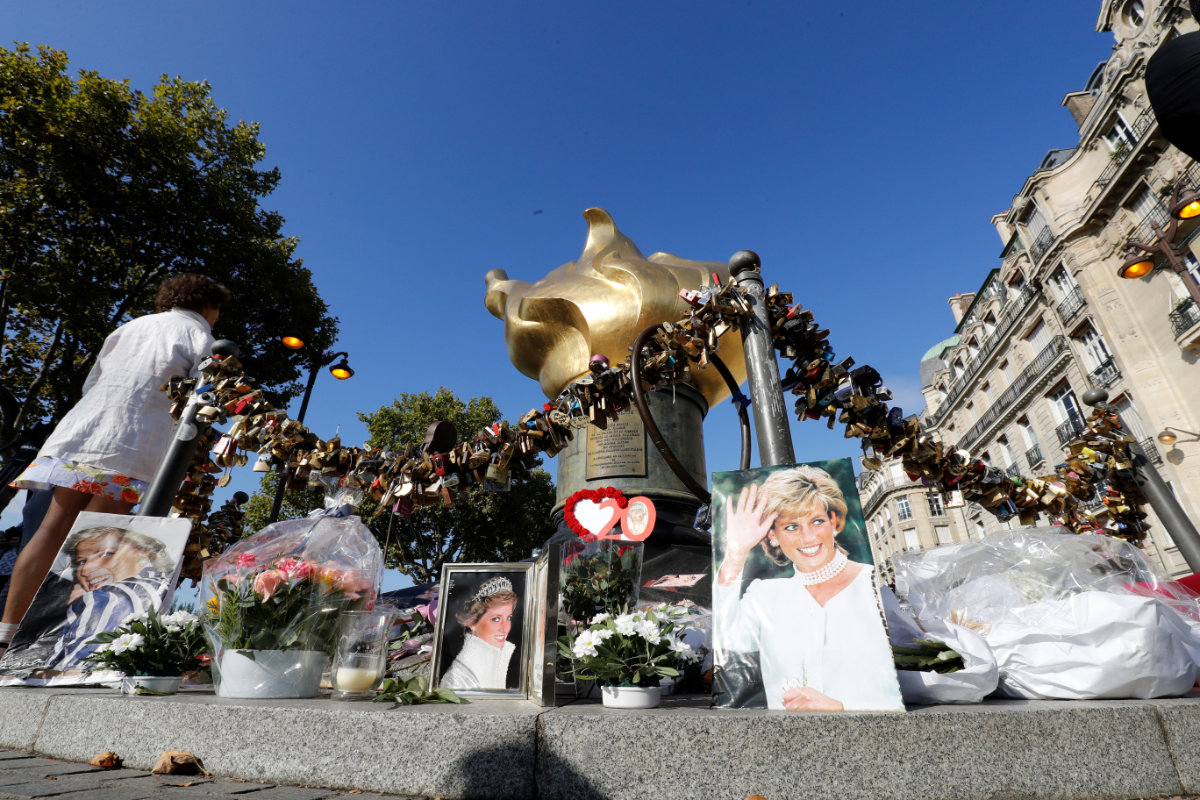
The Flame of Liberty monument in Paris has become an unofficial memorial for Diana, Princess of Wales who died in a car crash in a nearby tunnel in the early hours of August 31, 1997, along with her boyfriend Dodi Fayed and driver Henri Paul. (AFP/File)
The following year, he financed the production of a documentary film titled “Unlawful Killing,” in which he again accused Philip of responsibility for his son and Diana’s deaths. The film was shown at the Cannes Film Festival, but had no public release owing to legal issues.
Al-Fayed’s antagonism toward the British monarchy led him to support Scottish secession from the UK. He told the BBC in 2012 that he would move to Scotland if it achieved independence, and envisioned obtaining Scottish residency and running for its presidency.
He even claimed Scotland had Egyptian origins on the basis of a pharaonic princess who is believed to have traveled there in the past.
Throughout his life, Al-Fayed built an empire spanning various sectors, including shipping, real estate, banking, retail and contracting, but remained committed to philanthropy. With a fortune estimated at $2 billion, he died a wealthy man and was the 12th on the Forbes list of richest Arabs for this year.
